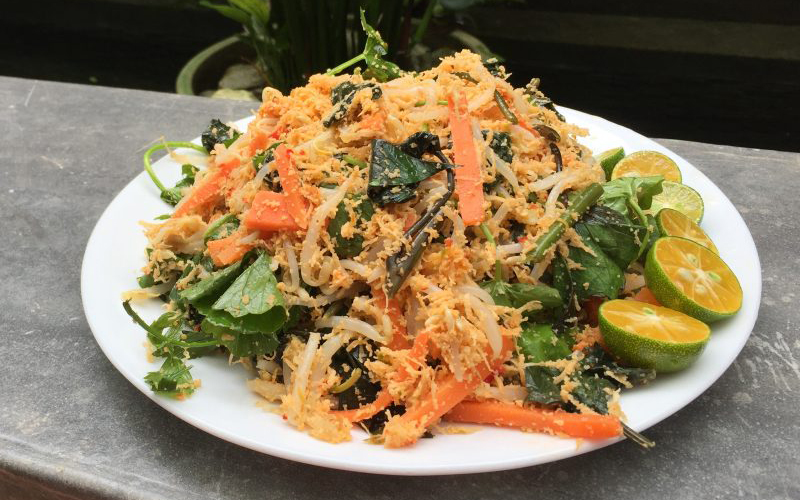
Urap is a Malaysian and Indonesian salad of Javanese origins comprised of steamed or boiled vegetables mixed with spiced toasted coconut. While the vegetables usually consist of water spinach, long beans, bean sprouts and cabbage, we love a version using fresh herbs such as pegaga and ulam raja which are packed with powerful nutrients. The combination of boiled and fresh vegetables with the rich taste of shredded spicy toasted coconut is not only addictive but good for you too.
Could Pegaga and Ulam Raja be the Secret to Youth?
If you have never heard of pegaga, it’s time to pay attention. This humble looking herb is rich in amino and fatty acids, beta carotene and phytonutrients, thus improves circulation and stimulates cell growth. What does this mean to us? Well, this in turn aids in collagen production, keeping your skin looking rejuvenated and your hair and nails strong. Besides being a beauty booster, a 2012 study found that Pegaga extract had a positive effect on protecting brain cells from toxicity.
What about ulam raja? This herb has long been used in Malaysian traditional medicine to help treat conditions such as high blood pressure, arthritis, fever and diabetes. To top it all off, ulam raja has antioxidants which help repair cells in your body thus preventing premature ageing.
Together these two herbs seem to be a great combination keeping you looking young and healthy.
Urap with Pegaga and Ulam Raja Recipe

Ingredients:
Spicy Coconut Mixture
- 2 fresh red chillies
- 5 green bird’s eye chillies (cili padi)
- 3 shallots, peeled
- 3 tbsp water
- 20g belacan (shrimp paste), optional
- 1 1/2 cup freshly grated white coconut flesh
- 1 tbsp brown sugar
- 3-4 lime leaves
- 1 tsp salt
Vegetables and Other Ingredients
- 200g water spinach (kangkung)
- 80g pegaga (centella asiatica, pennyword, gotu kola)
- 60g ulam raja (cosmos caudatus, king’s salad)
- 200g bean sprouts
- 100g carrot (about 1 small carrot)
- 1-2 tbsp lime juice (according to taste)
Method:
Spicy Coconut
- Blend or pound red chillies, bird’s eye chillies, shallots, belacan and 2 tbsp of water. Note: the addition of the belachan (shrimp paste) is optional as some people may not like the flavour. Set aside.
- Heat 2 tbsp of cooking oil in a pan. Add the blended chilli mixture and stir for 3 to 4 minutes.
- Add 1 tbsp brown sugar and 1 tsp salt. Stir.
- Add freshly grated coconut and the lime leaves for aroma. Continue to stir and toss the ingredients about so that they are mixed well. This should take about 3 minutes. Once done, discard the lime leaves and set aside the coconut mixture for later.
Vegetables
- Boil about 3 cups of water in a medium sized pot.
- Wash and prepare your vegetables. For water spinach, cut and discard the thick part of the stems. For pegaga, you want the leaves and just about 3 inches of the stem from the leaf. For the ulam raja, remove and discard the thick part of the stems. Peel the carrots and cut so that they form strips.
- Set aside the pegaga and ulam raja. These two will not be cooked but rather served fresh. The rest of the vegetables will be put in the hot water.
- Add the bean sprouts in the hot water for 30 seconds to 1 minute. Remove and set aside.
- Add carrots to the hot water. Boil for 3 minutes then remove and set aside.
- Add water spinach to the hot water. Boil for 3 minutes then remove and set aside.
- Now put everything together. In a large bowl, put all the vegetables together then add the coconut mixture along with lime juice. Toss until all the vegetables are coated with the coconut mixture.
- Serve.
Salads and More
If you’re a fan of our urap with pegaga and ulam raja, be sure to look up our kerabu pegaga recipe. It is much simpler to make as it does not require boiling or steaming vegetables. Besides, it features our favourite super herb, pegaga.
There are plenty more salads coming up on Butterkicap.com so do check back in with us once in a while or follow us on our Instagram or Facebook as we try out and post new recipes. If you have any recipes of your own to share, please do contact us on our social media platforms. We’re a community of foodies just wanting to share our recipes and spread our love for Malaysian food.
